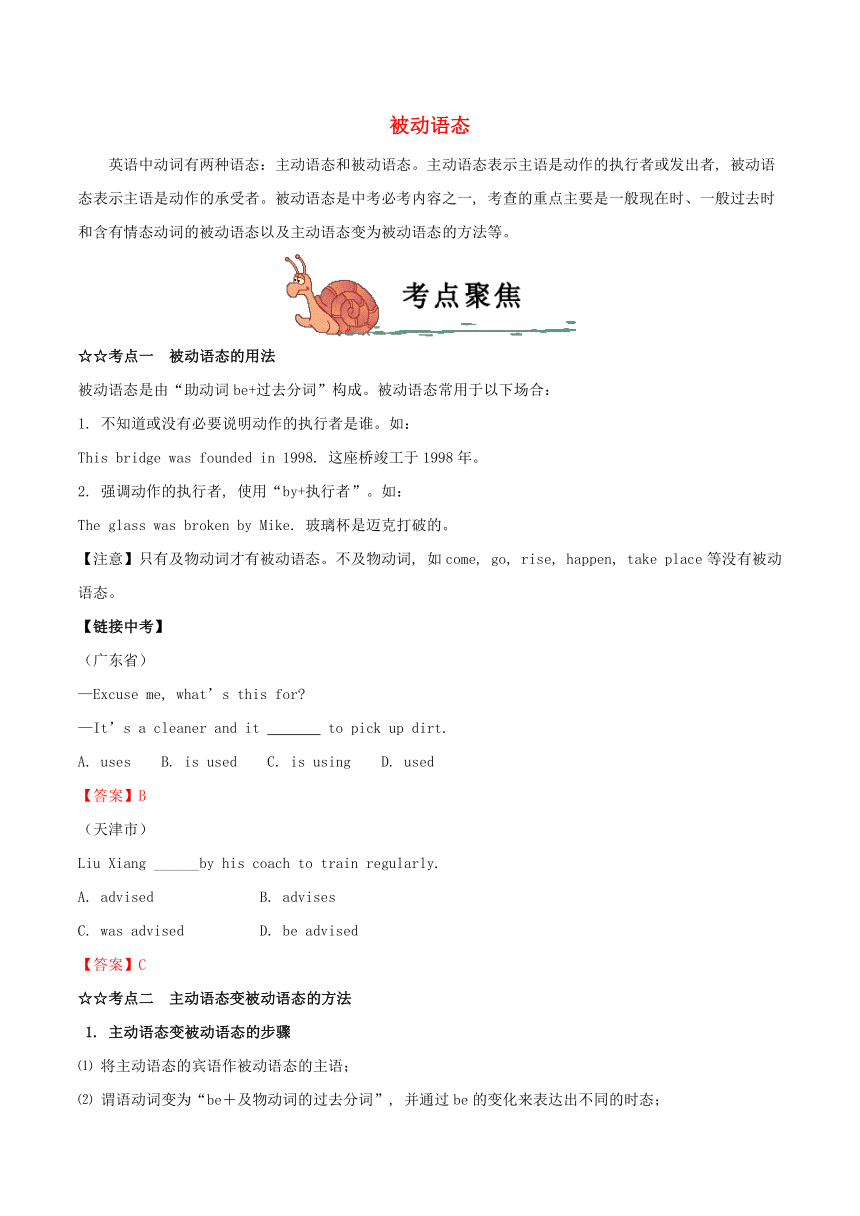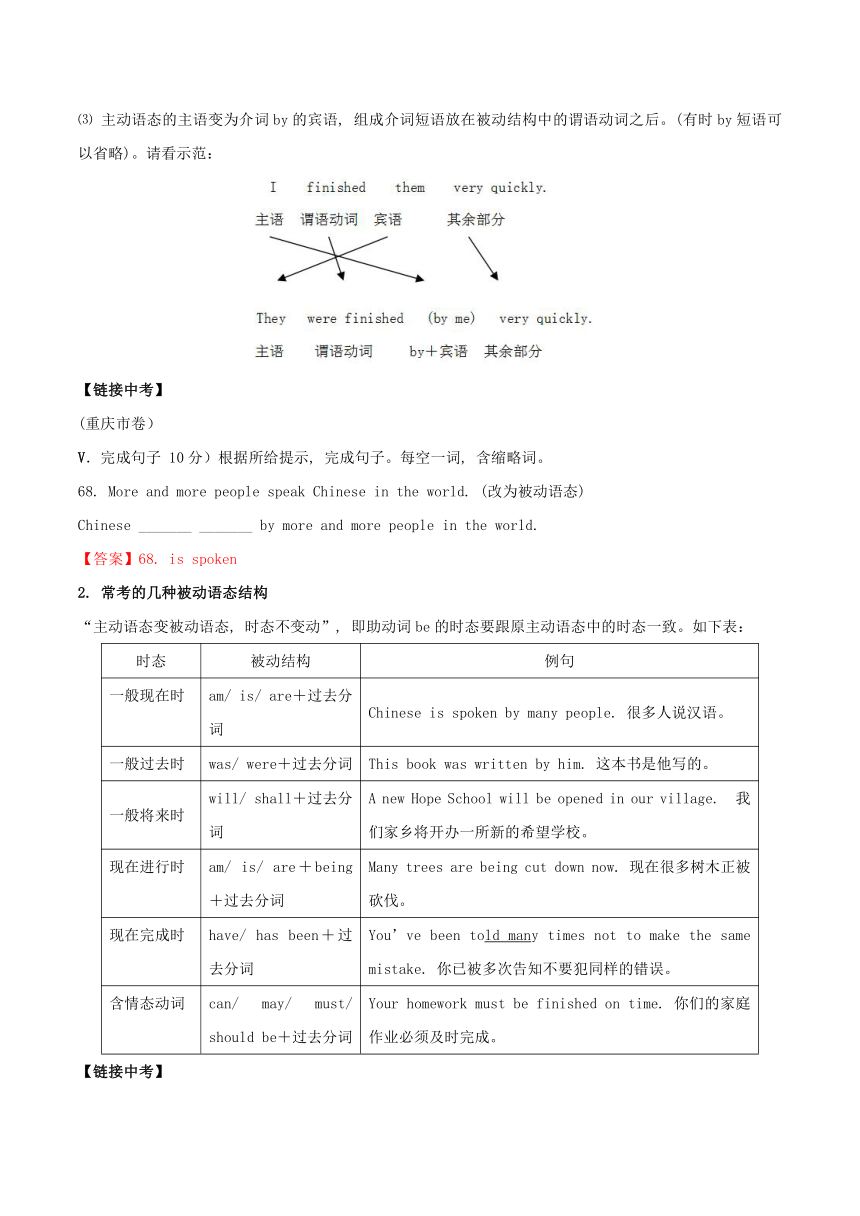外研版中考英语总复习(中册)第三篇 语法考点焦聚 专题09 被动语态
文档属性
| 名称 | 外研版中考英语总复习(中册)第三篇 语法考点焦聚 专题09 被动语态 |  | |
| 格式 | zip | ||
| 文件大小 | 37.0KB | ||
| 资源类型 | 教案 | ||
| 版本资源 | 外研版 | ||
| 科目 | 英语 | ||
| 更新时间 | 2016-08-25 21:42:51 | ||
图片预览


文档简介
被动语态
英语中动词有两种语态:主动语态和被动语态。主动语态表示主语是动作的执行者或发出者,
被动语态表示主语是动作的承受者。被动语态是中考必考内容之一,
考查的重点主要是一般现在时、一般过去时和含有情态动词的被动语态以及主动语态变为被动语态的方法等。
( http: / / www.21cnjy.com )
☆☆考点一
被动语态的用法
被动语态是由“助动词be+过去分词”构成。被动语态常用于以下场合:
1.
不知道或没有必要说明动作的执行者是谁。如:
This
bridge
was
founded
in
1998.
这座桥竣工于1998年。
2.
强调动作的执行者,
使用“by+执行者”。如:
The
glass
was
broken
by
Mike.
玻璃杯是迈克打破的。
【注意】只有及物动词才有被动语态。不及物动词,
如come,
go,
rise,
happen,
take
place等没有被动语态。
【链接中考】
(广东省)
—Excuse
me,
what’s
this
for
—It’s
a
cleaner
and
it
to
pick
up
dirt.
A.
uses
B.
is
used
C.
is
using
D.
used
【答案】B
(天津市)
Liu
Xiang
______by
his
coach
to
train
regularly.
A.
advised
B.
advises
C.
was
advised
D.
be
advised
【答案】C
☆☆考点二
主动语态变被动语态的方法
1.
主动语态变被动语态的步骤
⑴
将主动语态的宾语作被动语态的主语;
⑵
谓语动词变为“be+及物动词的过去分词”,
并通过be的变化来表达出不同的时态;
⑶
主动语态的主语变为介词by的宾语,
组成介词短语放在被动结构中的谓语动词之后。(有时by短语可以省略)。请看示范:
( http: / / www.21cnjy.com )
【链接中考】
(重庆市卷)
V.完成句子
10分)根据所给提示,
完成句子。每空一词,
含缩略词。
68.
More
and
more
people
speak
Chinese
in
the
world.
(改为被动语态)
Chinese
_______
_______
by
more
and
more
people
in
the
world.
【答案】68.
is
spoken
2.
常考的几种被动语态结构
“主动语态变被动语态,
时态不变动”,
即助动词be的时态要跟原主动语态中的时态一致。如下表:
时态
被动结构
例句
一般现在时
am/
is/
are+过去分词
Chinese
is
spoken
by
many
people.
很多人说汉语。
一般过去时
was/
were+过去分词
This
book
was
written
by
him.
这本书是他写的。
一般将来时
will/
shall+过去分词
A
new
Hope
School
will
be
opened
in
our
village.
我们家乡将开办一所新的希望学校。
现在进行时
am/
is/
are+being+过去分词
Many
trees
are
being
cut
down
now.
现在很多树木正被砍伐。
现在完成时
have/
has
been+过去分词
You’ve
been
told
man
( http: / / www.21cnjy.com )y
times
not
to
make
the
same
mistake.
你已被多次告知不要犯同样的错误。
含情态动词
can/
may/
must/
should
be+过去分词
Your
homework
must
be
finished
on
time.
你们的家庭作业必须及时完成。
【链接中考】
(河北省卷)
Hong
Kong
______
to
be
a
good
place
for
eating
today.
A.
knows
B.
knew
C.
is
known
D.
was
known
【答案】C
(山东省滨州市)
The
World
Expo
(世博会)
____________
in
Shanghai
now.
A.
being
had
B.
is
having
C.
is
holding
D.
is
being
held
【答案】D
(上海市)
A
Disneyland
Park(迪斯尼
( http: / / www.21cnjy.com )乐园)
_______
in
Shanghai
Pudong
New
Area
in
the
near
future.
A.
builds
B.
has
built
C.
will
build
D.
will
be
built
【答案】D
(江苏省南京市)
—Can
you
sing
this
English
song
—Of
course,
I
can.
It
_______many
times
on
the
radio.
A.
taught
B.
has
taught
C.
is
taught
D.
has
been
taught
【答案】D
☆☆考点三
带双宾语的主动句变为被动句
含有双宾语的主动句变为被动句有两种方法:
1.
把指“人”的间接宾语作被动语态的主语,
指“物”的直接宾语不动。
2.
把指“物”的直接宾语作被动语态的主语,
间接宾语前加介词to(在send,
pass,
write,
give,
show,
bring等动词后)或for(在动词buy,
cook,
make,
order,
choose等动词后)。如:
My
father
gave
me
a
lot
of
money.
→I
was
given
a
lot
of
money
by
my
father.
或→A
lot
of
money
was
given
to
me
by
my
father.
☆☆考点四
含有复合宾语的主动句变为被动句
1.
把含有复合宾语的主动句变为被动句时,
要把其中的宾语变为被动语态的主语,
原来的宾语补足语不变。如:
We
call
him
Zhou
Jian.
→
He
is
called
Zhou
Jian
(by
us).
2.
在主动句中,
一些表示感官或使役意义的动词,
如hear,
watch,
see,
feel,
listen
to,
look
at,
let,
have和help等后面的宾语补足语是动词不定式时,
主动语态中要用不带to的动词不定式,
但在变为被动语态时,
不定式符号to应加上。如:
We
often
hear
her
sin
( http: / / www.21cnjy.com )g
in
the
room.
→
She
is
often
heard
to
sing
in
the
room
(by
us).
【链接中考】
(山东泰安市)
The
girl
was
often
heard
happily
in
her
room.
A.
sing
B.
to
sing
C.
singing
D.
sings
【答案】B
(新疆省阜康市)
The
little
boy
______
by
the
big
one
this
morning.
A.
was
made
to
cry
B.
was
made
cry
C.
made
to
cry
D.
made
cry
【答案】A
☆☆考点五
短语动词的被动语态
有些短语动词相当于一个及物动词,
其后
( http: / / www.21cnjy.com )可接宾语,
因此它们也有被动语态。但短语动词是个不可分割的整体,
变为被动语态时不可丢掉其后的介词或副词。如:
We
should
look
after
old
people
very
well.
→Old
people
should
be
looked
after
very
well
(by
us).
【链接中考】
(广州市)
Don’t
worry.
All
the
children
______
by
the
nurses.
A.
are
well
taken
care
of
B.
take
good
care
of
C.
are
taken
good
care
of
D.
take
good
care
【答案】C
☆☆考点六
主动形式表示被动意义的几种情况
英语中,
有些动词主动形式却表示被动意义。这类动词虽然不多,
但很容易造成翻译和理解上的错误。主要有以下几种情况:
1.
作表语用的形容词,
如eas
( http: / / www.21cnjy.com )y,
difficult,
hard,
nice,
possible,
impossible等后面作状语的不定式,
其主动形式表示被动意义。如:
I
think
English
is
easy
to
learn.
我认为英语很容易学。
2.
当不定式作定语,
又与所修饰的名词或代词构成动宾关系时,
其主动形式表示被动意义。如:
I
have
a
lot
of
work
to
do
today.
今天我有许多工作要做。
3.
某些表示状态特征的系动词,
如:sound,
seem,
smell,
taste等常用主动形式表示被动意义。如:
Those
apples
taste
good.
那些苹果很好吃。
4.
有些动词,
如lock,
s
( http: / / www.21cnjy.com )ell,
wash,
read,
write,
open,
wear,
cook,
burn,
keep,
feel等,
其主动形式在一些具体场合表示被动意义。如:
This
book
sells
well.
这本书很畅销。
5.
too…to…结构中的不定式的主动形式表示被动意义。如:
The
box
is
too
heavy
to
carry.
箱子太重搬不动。
6.
在“疑问代词what
(which,
( http: / / www.21cnjy.com )whom)+不定式”结构中,
不定式的主动形式表示被动意义。如:She’ll
tell
you
which
to
choose.
她将告诉你该选哪一个。
7.
某些只能用作不及物动词的动词或短语,
如happen,
take
place(发生)等,
其主动形式表示被动意义。如:
The
accident
happened
two
hours
ago.
事故发生在两小时以前。
英语中动词有两种语态:主动语态和被动语态。主动语态表示主语是动作的执行者或发出者,
被动语态表示主语是动作的承受者。被动语态是中考必考内容之一,
考查的重点主要是一般现在时、一般过去时和含有情态动词的被动语态以及主动语态变为被动语态的方法等。
( http: / / www.21cnjy.com )
☆☆考点一
被动语态的用法
被动语态是由“助动词be+过去分词”构成。被动语态常用于以下场合:
1.
不知道或没有必要说明动作的执行者是谁。如:
This
bridge
was
founded
in
1998.
这座桥竣工于1998年。
2.
强调动作的执行者,
使用“by+执行者”。如:
The
glass
was
broken
by
Mike.
玻璃杯是迈克打破的。
【注意】只有及物动词才有被动语态。不及物动词,
如come,
go,
rise,
happen,
take
place等没有被动语态。
【链接中考】
(广东省)
—Excuse
me,
what’s
this
for
—It’s
a
cleaner
and
it
to
pick
up
dirt.
A.
uses
B.
is
used
C.
is
using
D.
used
【答案】B
(天津市)
Liu
Xiang
______by
his
coach
to
train
regularly.
A.
advised
B.
advises
C.
was
advised
D.
be
advised
【答案】C
☆☆考点二
主动语态变被动语态的方法
1.
主动语态变被动语态的步骤
⑴
将主动语态的宾语作被动语态的主语;
⑵
谓语动词变为“be+及物动词的过去分词”,
并通过be的变化来表达出不同的时态;
⑶
主动语态的主语变为介词by的宾语,
组成介词短语放在被动结构中的谓语动词之后。(有时by短语可以省略)。请看示范:
( http: / / www.21cnjy.com )
【链接中考】
(重庆市卷)
V.完成句子
10分)根据所给提示,
完成句子。每空一词,
含缩略词。
68.
More
and
more
people
speak
Chinese
in
the
world.
(改为被动语态)
Chinese
_______
_______
by
more
and
more
people
in
the
world.
【答案】68.
is
spoken
2.
常考的几种被动语态结构
“主动语态变被动语态,
时态不变动”,
即助动词be的时态要跟原主动语态中的时态一致。如下表:
时态
被动结构
例句
一般现在时
am/
is/
are+过去分词
Chinese
is
spoken
by
many
people.
很多人说汉语。
一般过去时
was/
were+过去分词
This
book
was
written
by
him.
这本书是他写的。
一般将来时
will/
shall+过去分词
A
new
Hope
School
will
be
opened
in
our
village.
我们家乡将开办一所新的希望学校。
现在进行时
am/
is/
are+being+过去分词
Many
trees
are
being
cut
down
now.
现在很多树木正被砍伐。
现在完成时
have/
has
been+过去分词
You’ve
been
told
man
( http: / / www.21cnjy.com )y
times
not
to
make
the
same
mistake.
你已被多次告知不要犯同样的错误。
含情态动词
can/
may/
must/
should
be+过去分词
Your
homework
must
be
finished
on
time.
你们的家庭作业必须及时完成。
【链接中考】
(河北省卷)
Hong
Kong
______
to
be
a
good
place
for
eating
today.
A.
knows
B.
knew
C.
is
known
D.
was
known
【答案】C
(山东省滨州市)
The
World
Expo
(世博会)
____________
in
Shanghai
now.
A.
being
had
B.
is
having
C.
is
holding
D.
is
being
held
【答案】D
(上海市)
A
Disneyland
Park(迪斯尼
( http: / / www.21cnjy.com )乐园)
_______
in
Shanghai
Pudong
New
Area
in
the
near
future.
A.
builds
B.
has
built
C.
will
build
D.
will
be
built
【答案】D
(江苏省南京市)
—Can
you
sing
this
English
song
—Of
course,
I
can.
It
_______many
times
on
the
radio.
A.
taught
B.
has
taught
C.
is
taught
D.
has
been
taught
【答案】D
☆☆考点三
带双宾语的主动句变为被动句
含有双宾语的主动句变为被动句有两种方法:
1.
把指“人”的间接宾语作被动语态的主语,
指“物”的直接宾语不动。
2.
把指“物”的直接宾语作被动语态的主语,
间接宾语前加介词to(在send,
pass,
write,
give,
show,
bring等动词后)或for(在动词buy,
cook,
make,
order,
choose等动词后)。如:
My
father
gave
me
a
lot
of
money.
→I
was
given
a
lot
of
money
by
my
father.
或→A
lot
of
money
was
given
to
me
by
my
father.
☆☆考点四
含有复合宾语的主动句变为被动句
1.
把含有复合宾语的主动句变为被动句时,
要把其中的宾语变为被动语态的主语,
原来的宾语补足语不变。如:
We
call
him
Zhou
Jian.
→
He
is
called
Zhou
Jian
(by
us).
2.
在主动句中,
一些表示感官或使役意义的动词,
如hear,
watch,
see,
feel,
listen
to,
look
at,
let,
have和help等后面的宾语补足语是动词不定式时,
主动语态中要用不带to的动词不定式,
但在变为被动语态时,
不定式符号to应加上。如:
We
often
hear
her
sin
( http: / / www.21cnjy.com )g
in
the
room.
→
She
is
often
heard
to
sing
in
the
room
(by
us).
【链接中考】
(山东泰安市)
The
girl
was
often
heard
happily
in
her
room.
A.
sing
B.
to
sing
C.
singing
D.
sings
【答案】B
(新疆省阜康市)
The
little
boy
______
by
the
big
one
this
morning.
A.
was
made
to
cry
B.
was
made
cry
C.
made
to
cry
D.
made
cry
【答案】A
☆☆考点五
短语动词的被动语态
有些短语动词相当于一个及物动词,
其后
( http: / / www.21cnjy.com )可接宾语,
因此它们也有被动语态。但短语动词是个不可分割的整体,
变为被动语态时不可丢掉其后的介词或副词。如:
We
should
look
after
old
people
very
well.
→Old
people
should
be
looked
after
very
well
(by
us).
【链接中考】
(广州市)
Don’t
worry.
All
the
children
______
by
the
nurses.
A.
are
well
taken
care
of
B.
take
good
care
of
C.
are
taken
good
care
of
D.
take
good
care
【答案】C
☆☆考点六
主动形式表示被动意义的几种情况
英语中,
有些动词主动形式却表示被动意义。这类动词虽然不多,
但很容易造成翻译和理解上的错误。主要有以下几种情况:
1.
作表语用的形容词,
如eas
( http: / / www.21cnjy.com )y,
difficult,
hard,
nice,
possible,
impossible等后面作状语的不定式,
其主动形式表示被动意义。如:
I
think
English
is
easy
to
learn.
我认为英语很容易学。
2.
当不定式作定语,
又与所修饰的名词或代词构成动宾关系时,
其主动形式表示被动意义。如:
I
have
a
lot
of
work
to
do
today.
今天我有许多工作要做。
3.
某些表示状态特征的系动词,
如:sound,
seem,
smell,
taste等常用主动形式表示被动意义。如:
Those
apples
taste
good.
那些苹果很好吃。
4.
有些动词,
如lock,
s
( http: / / www.21cnjy.com )ell,
wash,
read,
write,
open,
wear,
cook,
burn,
keep,
feel等,
其主动形式在一些具体场合表示被动意义。如:
This
book
sells
well.
这本书很畅销。
5.
too…to…结构中的不定式的主动形式表示被动意义。如:
The
box
is
too
heavy
to
carry.
箱子太重搬不动。
6.
在“疑问代词what
(which,
( http: / / www.21cnjy.com )whom)+不定式”结构中,
不定式的主动形式表示被动意义。如:She’ll
tell
you
which
to
choose.
她将告诉你该选哪一个。
7.
某些只能用作不及物动词的动词或短语,
如happen,
take
place(发生)等,
其主动形式表示被动意义。如:
The
accident
happened
two
hours
ago.
事故发生在两小时以前。
同课章节目录
- 词法
- 名词
- 动词和动词短语
- 动词语态
- 动词时态
- 助动词和情态动词
- 非谓语动词
- 冠词
- 代词
- 数词和量词
- 形容词副词及其比较等级
- 介词和介词短语
- 连词和感叹词
- 构词法
- 相似、相近词比较
- 句法
- 陈述句
- 一般疑问句和否定疑问句
- 特殊疑问句及选择疑问句
- 反意疑问句
- 存在句(There be句型)
- 宾语从句
- 定语从句
- 状语从句
- 主谓一致问题
- 简单句
- 并列句
- 复合句
- 主谓一致
- 主、表语从句
- 名词性从句
- 直接引语和间接引语
- 虚拟语气
- 感叹句
- 强调句
- 倒装句
- 祈使句
- 句子的成分
- 句子的分类
- 题型专区
- 单项选择部分
- 易错题
- 完形填空
- 阅读理解
- 词汇练习
- 听说训练
- 句型转换
- 补全对话
- 短文改错
- 翻译
- 书面表达
- 任务型阅读
- 语法填空
- 其他资料
